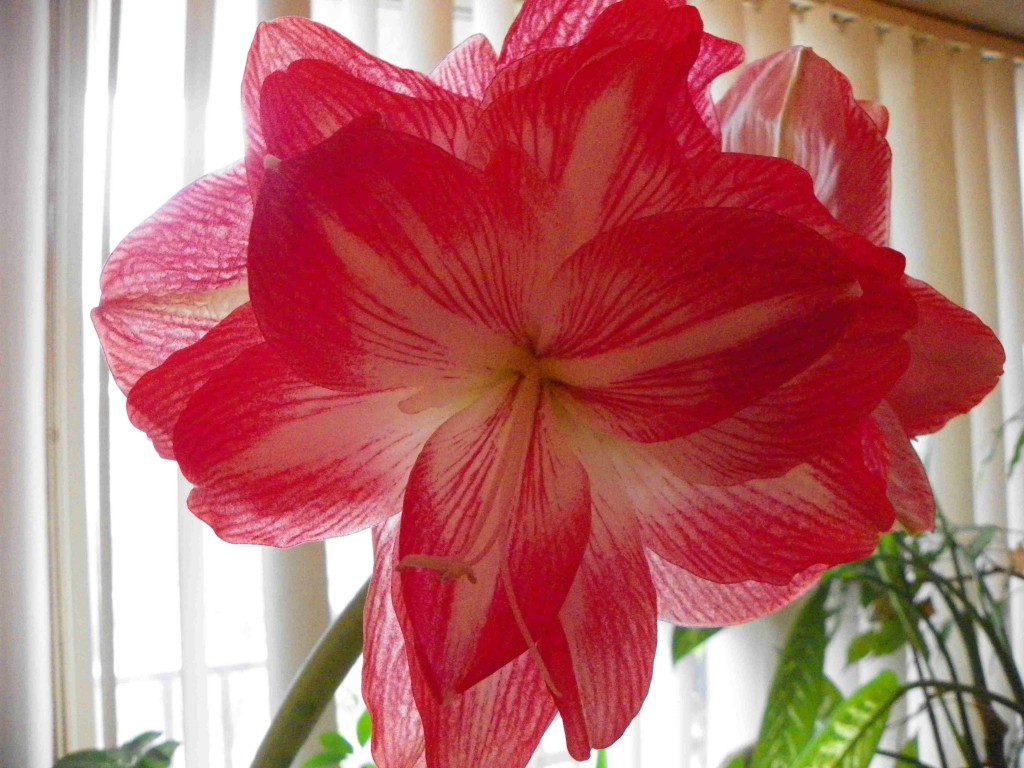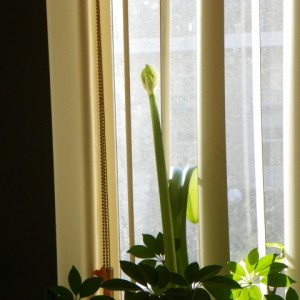DELMARVA REVIEW SUBMISSION DEADLINE FEB. 28
The Review is in search of submissions for its sixth annual edition, focusing on the best unpublished work from authors in the Delmarva and Cheseapeake Bay area and beyond. Categories include fiction, poetry, and creative nonfiction. For guidelines, visit the Web-site: www.delmarvareview.com.
SO COME AMARYLLIS, HIPPEASTRUM
I can’t remember the last time I bought a houseplant. Houseplants seem to find me. I used to joke that someday I would go down in history as the patron saint of houseplants.
The oldest potted plant still in my possession is a pothos (genus Scindapsus) which was a gift from Pam, dating from the 1980s, which for many years lived in its original hanging basket accessorized with a red ribbon and bow. My mother gave me a cutting from an Aloe sealed in a plastic storage bag sometime around 1990; the succulent and its descendants are still around, and, in fact, abound. Before my sister Liz left New York for San Francisco in the ‘90s, I received, by way of bequest, a jade plant (Crassula argentea) and a snake plant (Sansevieria trifasciata), part of a horticultural Diaspora of houseplants that would not be making the transcontinental journey with her. Even so–when the time came–my plants made the trip with me when I moved from Manhattan.
By now established in Washington, DC, I adopted a dwarf fig tree (Ficus benjamina) from the garage of Joyce and Chris, living not far over the border in Maryland, who had presumably grown tired of sweeping up after the Ficus’s ever-dropping leaves from their dining-room floor. At one time, the family had had four Ficus trees as I recall, and I imagine the one I took home was the one they hadn’t been able to give away for a song at their last yard sale. (At a minimum, I have come to the belief that when things start showing up in Joyce and Chris’s garage a yard sale is not far off.) It was Chris, in fact, who first referred to my apartment as “an arboretum” (but I’ve cleaned up his language a bit).
Perhaps because I had in the past been the de-facto “waterer” of their houseplants and garden plot when they had traveled, I was actually once put in charge of the transportation of houseplants, designated the houseplant-transport specialist, when Judy and Pat moved to a new neighborhood in Northwest. The plants and I had a specifically-designated chauffer. The only casualty of the journey was a spider plant (Chlorophytum), one of whose satellite spider plants had been detached from the stem connecting it to the mother spider plant. With their thanks for a task well done, the spider-plant seedling became part of my compensation.
When Brandy, a neighbor from upstairs, moved to the Bronx, I was given a dumb cane (Dieffenbachia) and an elephant’s ear (Philodendron hastatum). I actually don’t think she ever intended for me to take anything symbolically or personally.
When Junienne, another neighbor from upstairs, moved to Memphis, I was gifted her favorite houseplants–umbrella trees (Brassaia actinophllya; also known as Schefflera) and more snake plants (also known unflatteringly and colloquially as mother-in-law’s tongues).
Then when the Jaitly’s from next door were in the midst of relocating to Annandale, Mrs. Jaitly came by one morning and gushed over the arboretum again–as if it were to her mentation my only redeeming quality–and handed me an amaryllis in a white plastic pot. The dirt seemed dry and I watered the plant in her presence. The pot gurgled as the water filtered down. I learned that the bottom of the pot had been filled with crushed seashells for drainage.
With no special care on my part, beginning during the darkest days of the year, the amaryllis bulb stirs back to life. In improbable February, a stem begins to soar. It seems that I turn my back for a minute, and the stem has grown another inch. The stem is now over two feet tall and climbing. The bud is almost ready to burst open. So come amaryllis!

